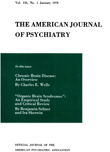Alcoholics' Patterns of Controlled Drinking
Abstract
Groups of seven to ten volunteer alcoholic patients were studied and treated on a closed ward where alcohol was available. Of 66 patients who completed the program, 44 percent did not drink at any time, 33 percent drank throughout the drinking phase of the program, and 23 percent began drinking and then stopped. The results of this study question the assumption that drinking by alcoholics necessarily results in irresistible craving, more drinking, and loss of control. The authors point out the need for research into the circumstances and maneuvers that influence resistance to drinking.
Access content
To read the fulltext, please use one of the options below to sign in or purchase access.- Personal login
- Institutional Login
- Sign in via OpenAthens
- Register for access
-
Please login/register if you wish to pair your device and check access availability.
Not a subscriber?
PsychiatryOnline subscription options offer access to the DSM-5 library, books, journals, CME, and patient resources. This all-in-one virtual library provides psychiatrists and mental health professionals with key resources for diagnosis, treatment, research, and professional development.
Need more help? PsychiatryOnline Customer Service may be reached by emailing [email protected] or by calling 800-368-5777 (in the U.S.) or 703-907-7322 (outside the U.S.).



